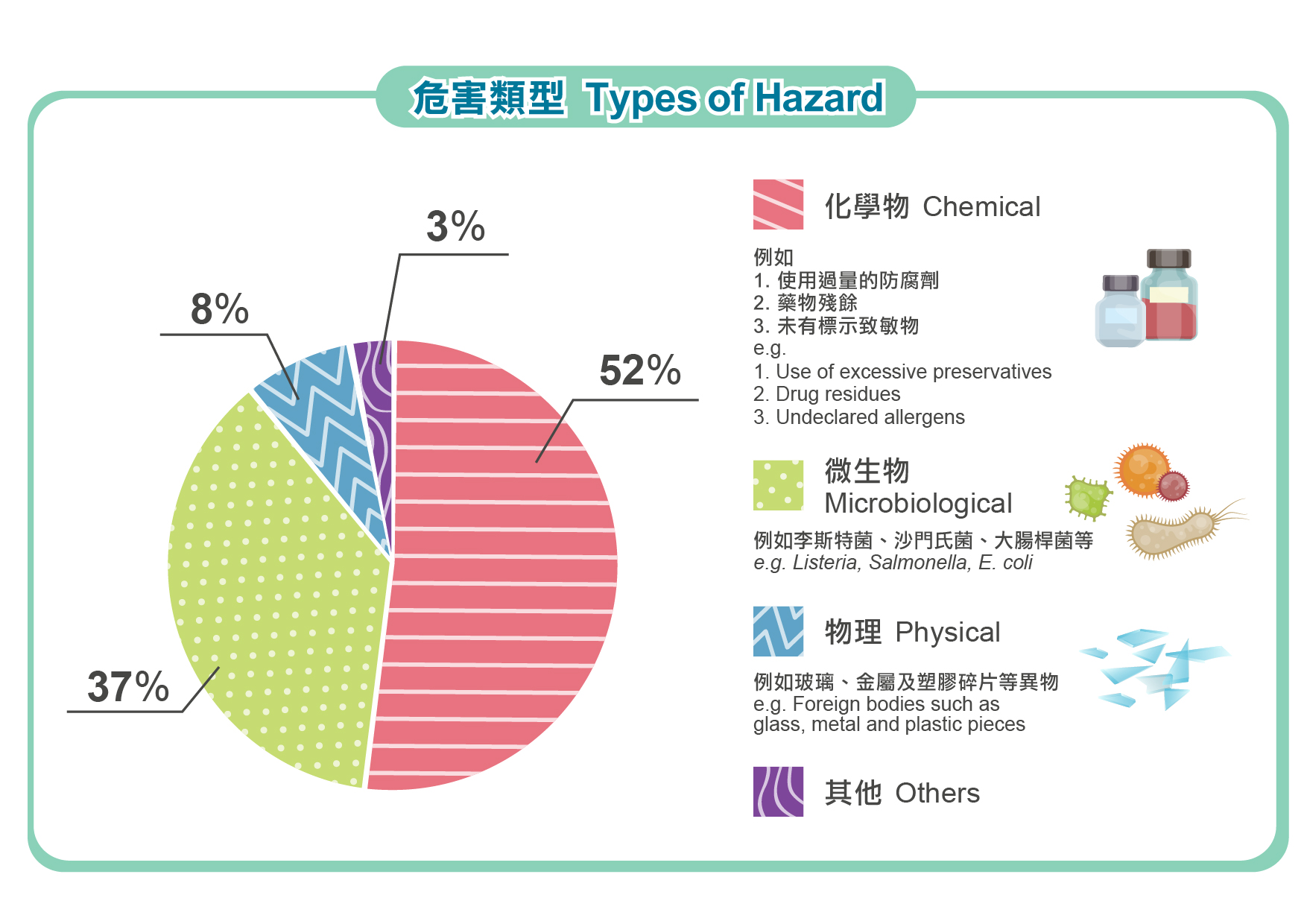
Food Safety Focus (178th Issue, May 2021) – Incident in Focus
Review of Food Incidents in 2020
Reported by Dr. Yu-ching LI, Medical & Health Officer,
Risk Management Section, Centre for Food Safety
Food incidents can occur near and far around the world while globalisation increases the complexity of the food supply chain. The Centre for Food Safety (CFS) has established a Food Incident Surveillance System (FISS) to monitor food incidents outside Hong Kong actively. The CFS takes swift actions in response to the food incidents to minimise the potential local impacts by adopting the risk analysis framework, namely risk assessment, risk management and risk communication.
Food Incidents in 2020
In 2020, the CFS identified more than 2,000 food incidents from the FISS, including about 440 food incidents related to undeclared allergens. The CFS took various pertinent actions in response to the incidents with local relevance, including conducting risk assessment, checking import records and contacting relevant authorities and traders. In parallel, the CFS might issue a food incident post to alert the public of the incident and provide appropriate food safety advice.
Upon identifying local circulation of the affected food products on the market, the CFS would instruct the trade to stop the sale or initiate a recall. The CFS would then issue local alerts accordingly, such as press release, food alert and trade alert, to inform consumers and the trade not to consume or sell the affected products.
In 2020, the CFS issued 215 food incident posts, 15 trade alerts, 14 food alerts and 14 press releases. The hazards identified in these incidents include chemical (e.g. use of excessive preservatives, drug residues, undeclared allergens, etc.), microbiological (e.g. Listeria, Salmonella, Escherichia coli, etc.), physical (e.g. foreign bodies) and others. Over 50% of the incidents were related to chemical hazards (see Figure 1).

Figure 1: Types of hazard involved in food incidents with local alerts or food incident posts issued
Food Incidents Management
When a food incident occurs, traceability of food products is key to implementing suitable risk management measures. The legal framework of food safety control, collaboration with international food safety organisations, and liaison with the food trade enable the CFS to effectively track the import and distribution of the affected products in Hong Kong. The following food incident illustrates how the CFS detects and manages food incidents promptly through the FISS, followed by multidisciplinary actions.
Metronidazole in eggs from a Ukrainian farm
In July 2020, the CFS identified a notice issued by the Singapore Food Agency, through the FISS, that an egg product from a farm in Ukraine was detected with metronidazole.
Metronidazole is an antibiotic that kills bacteria and protozoa. According to the Codex Alimentarius Commission, there was a lack of data to establish a safe level of residues of metronidazole in food representing an acceptable risk to consumers, and significant health concerns were identified. Therefore, competent authorities should prevent residues of metronidazole in food.
The CFS immediately contacted the Ukrainian and Singaporean authorities for details of the incident. Under the current regulatory arrangement, importers of eggs are required to obtain an import permission and report the arrival of egg consignments to respective Food Inspection Offices. With the import control measures in place, the CFS quickly identified the local egg importers having imported eggs from the farm concerned and obtained relevant import details, which were consistent with the export information provided by the Ukrainian authority. The CFS held the egg consignments from the farm concerned for testing at import level and required importers not to sell the eggs involved until satisfactory test results were available.
One of the egg samples collected by the CFS was detected to contain metronidazole. The entire consignment of eggs was not released to the local market and was disposed afterwards. The CFS instructed the trade to stop selling all batches of eggs from the farm concerned. Besides, the CFS suspended the import into and sale within Hong Kong of eggs produced in the farm concerned. The CFS issued a press release and a trade alert to inform the public and the trade respectively.
The CFS continues to liaise with the competent authorities of Ukraine and assess the investigation findings and remedial measures taken. The CFS will review the import control arrangement of eggs from the farm concerned.
Conclusion
The CFS strives to reduce the public health impacts of food incidents. Through the FISS and the established control measures, the CFS detects food incidents and formulates strategies with a view to safeguarding public’s health timely and proactively.

